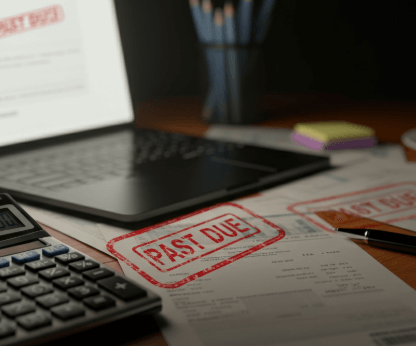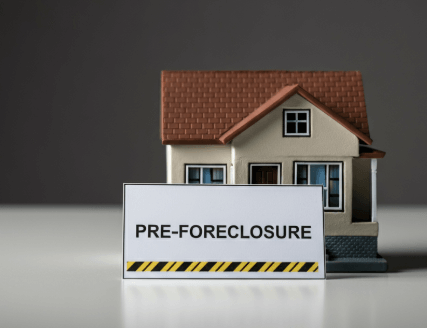Navigating the complexities of real estate, one might often encounter the term “What is a Pre-Foreclosure?” especially within the context of the Florida housing market. This introductory guide is designed to shed light on the intricacies of “What is a Pre-Foreclosure?” in Florida, offering a clear and concise overview for homeowners and investors alike. Pre-foreclosure represents a critical phase in the mortgage process, signaling challenges and opportunities ahead. This blog aims to demystify the pre-foreclosure process, providing valuable insights and guidance to those navigating these turbulent waters in the Sunshine State.
Steve Daria and Joleigh are savvy real estate investors who have turned their attention toward the unique opportunities presented by pre-foreclosures in Florida. They understand that pre-foreclosures occur when a homeowner fails to meet their mortgage obligations and the lender initiates a legal notice of default. Yet, the property still needs to be foreclosed upon. By focusing on this niche, they can identify potential investment properties before they hit the broader market, giving them a competitive edge.
Key Points
- Definition of Pre-Foreclosure: What is a Pre-Foreclosure? It is a stage in the foreclosure process where the homeowner has defaulted on mortgage payments but has not yet been foreclosed. This period allows the homeowner to settle the debt or sell the property to avoid full foreclosure.
- Process of Pre-Foreclosure: It begins once the lender files a notice of default, alerting the homeowner of their payment delinquency. This notice starts a timeline where the homeowner can take corrective action to resolve the default.
- Implications for Homeowners: The impact creates a financial bind, allowing them to negotiate with the lender or sell the property. Effectively managing the default can assist in preventing the adverse impact of foreclosure on their credit history.
- Opportunities for Buyers: For potential buyers, understanding “What is a Pre-Foreclosure” reveals opportunities to purchase properties below market value. Buyers can negotiate directly with the homeowner to buy the property before it goes into full foreclosure, often resulting in favorable terms.
- Potential Outcomes: The process can end with the homeowner reinstating the loan, selling the property, or, unfortunately, moving to foreclosure if no resolution is found. Each outcome depends on the homeowner’s ability to manage the default and make arrangements with the lender.
Our Guide to Pre-Foreclosure – Unveiling the Complexities
Pre-foreclosure in Florida marks the initial stage of the foreclosure process when a homeowner has defaulted on their mortgage but still retains ownership of the property.
This period offers a critical window for homeowners to rectify their mortgage issues or negotiate a sale before the lender proceeds with foreclosure. This section will delve into understanding “what is a pre-foreclosure?”
What is a Pre-Foreclosure?
To understand “what is a pre-foreclosure,” Pre-foreclosure is the period that begins when the lender files the default notice on the property, and it typically ends with the property being sold at a foreclosure auction.
It is the phase of property ownership where the owner is at risk of losing the home due to the lack of prompt mortgage payments.

In Florida, this process follows a strict legal path, yet one with numerous off-ramps, or lifelines, available to those who act diligently and with awareness.
How Does Pre-Foreclosure Happen?
Pre-foreclosure can occur for many reasons, primarily rooted in financial struggles. It might result from a sudden job loss, an illness that leads to mountains of medical bills, or even a shift in the real estate market that impacts property value.
The lender initiates the foreclosure process once mortgage payments are missed, typically three to six months’ worth. This usually involves sending a Notice of Default letter to the homeowner, marking the official start of the pre-foreclosure stage.
The Preliminary Steps to Pre-Foreclosure in Florida
Naturally, the pre-foreclosure process intensifies once the lender has filed a notice of default. However, Florida law provides specific rights and procedures that must be followed.
Homeowners must understand these steps to buy time, seek legal advice, or initiate selling their homes on their terms.
Get An Offer Today, Sell In A Matter Of Days…
Navigating the “What is a pre-foreclosure” Florida Landscape – Your Step-By-Step Guide
Pre-foreclosure in Florida is the crucial period between the homeowner’s mortgage default and the lender initiating formal foreclosure.
This guide aims to empower homeowners with strategies to manage their situation effectively, from understanding their legal rights to exploring options to prevent foreclosure.
Understanding the Lis Pendens Filing
The formal filing that signals pre-foreclosure in Florida is known as a Lis Pendens. Translated from Latin, it means “suit pending,” it serves as public notice that the property is subject to a lawsuit.
For homeowners, this filing is a technicality with hefty implications. It signals the start of formal foreclosure proceedings, often with a 20-day window for the homeowner’s legal response.
Your Rights and Opportunities During Pre-Foreclosure
Homeowners in Florida have decisive rights at this juncture. They are entitled to receive information from the lender about the pathway to default, the money owed, and the procedures to save the home.
Further, homeowners can seek public or legal assistance to understand their rights, and they have the power to reinstate the mortgage by paying off or negotiating the repayment of the defaulted balance.

Seeking Mediation or Loan Modification
Many homeowners, drowning in the sea of missed payments, turn to mediation or loan modification as a last-ditch effort to salvage their homes. Florida mandates mediation as an option for borrowers facing foreclosure, whereby borrowers and lenders convene to discuss alternatives that could prevent default.
Alternatively, seeking a loan modification can alter the terms of the mortgage to make it more affordable. This might include lower interest rates, extended terms, or a reduced principal owed, giving homeowners a fresh opportunity to manage their debts.
Short Sale as an Alternative to Foreclosure
Short sales provide a viable solution for homeowners who can’t pursue reinstatement, mediation, or loan modification.
By opting for a short sale, they can negotiate with their lender to sell their home for less than the mortgage amount, thus avoiding the harsh credit impact of foreclosure.
This short sales process protects homeowners’ equity and maintains their ability to purchase a home in the future.
While short sales involve reaching an agreement with the lender on a reduced sale price, it can significantly relieve financial distress.
Ultimately, short sales offer a strategic way to manage unaffordable mortgages without enduring the severe consequences of foreclosure.
Realizing Solutions – How to Navigate and Overcome Pre-Foreclosure Successfully
Successfully navigating pre-foreclosure involves proactive measures, including seeking financial advice, understanding your rights as a homeowner, and considering refinancing or selling the property.
Taking immediate action can prevent foreclosure, preserve your credit rating, and allow you to keep your home or exit the situation with financial dignity.
Staying Connected with Your Lender
One of the most pivotal steps in managing pre-foreclosure is open communication with the lender.
Regular discussions about your financial situation, potential tax implications, and any support offered by the government or charitable organizations are essential.
Exploring Forbearance Agreements
Forbearance agreements, a reprieve on mortgage payments, can be a lifeline for struggling homeowners.
It is an agreement between the homeowner and the lender to delay or reduce costs for a specified time, after which the loans return to regular terms.
Selling to Stop Foreclosure
Selling your home is a direct way to halt the foreclosure process. By doing so, homeowners can repay the mortgage in full, often with provisions to avoid the extensive legal proceedings and expenses associated with foreclosure.
Filing for Bankruptcy
Bankruptcy is a controversial yet impactful step that can halt the foreclosure process. It issues an automatic stay that stops all collection efforts, including foreclosure proceedings.
While it is not a solution for every homeowner facing pre-foreclosure, it can provide a strategic pause, allowing the borrower to assess their options, especially if they have significant non-mortgage debt.
Seek Professional Advice
Navigating the complexities of pre-foreclosure on your own can be daunting. To further understand what is a pre-foreclosure, it is highly recommended that you seek professional advice from attorneys specializing in real estate law, financial advisors, and real estate agents with a track record of pre-foreclosure.
These professionals can provide tailored advice and help homeowners craft strategies toward resolution. Each pre-foreclosure case is unique, and a personalized approach is often the most effective.
The Aftermath of Pre-Foreclosure – Rebuilding Post-Crisis
Pre-foreclosure serves as a stark crossroad in homeownership. The direction taken can dramatically impact personal finances, credit history, and future real estate endeavors.
Rebuilding Credit
The process of rebuilding credit post-pre-foreclosure takes time and meticulous attention. This involves paying bills on time, maintaining low credit balances, and being cautious about credit applications.
Options for Relocation and New Housing
Understanding the options for relocation is critical for homeowners unable to retain their properties.
This may involve renting, seeking government housing assistance, or working with lenders who specialize in post-foreclosure housing solutions.
Learning from the Experience
Pre-foreclosure is not just a financial setback but a profound learning experience. Whether it’s better budgeting, seeking residual income sources, or understanding the intricacies of the real estate market, the lessons taken from this ordeal can be powerful.
**NOTICE: Please note that the content presented in this post is intended solely for informational and educational purposes. It should not be construed as legal or financial advice or relied upon as a replacement for consultation with a qualified attorney or CPA. For specific guidance on legal or financial matters, readers are encouraged to seek professional assistance from an attorney, CPA, or other appropriate professional regarding the subject matter.

